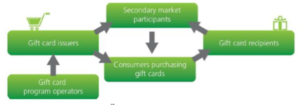
Trreasury has issued a Consultation Regulatory Impact Statement (RIS) on gift cards which examines the issue of gift card expiry dates and presents three options to reduce consumer detriment from expired gift cards.
The RIS examines options to reform gift card expiry dates to achieve a uniform national approach for all types of gift cards (regardless of their delivery mechanism).
Options
The three options are:
• Option 1 – the status quo;
• Option 2 – prohibition on gift card expiry dates;
• Option 3 – three year minimum expiry dates.
The RIS states that introducing a minimum three year expiry period (option 3) is the preferred policy option at this time. It says that such an approach would address the information asymmetry that may be faced by a recipient of a gift card who is unaware of its expiry date, and expects that it last for a reasonable period of time.
There is currently no uniform national regulation for the minimum length of time a gift card should last. In late 2017, New South Wales introduced laws requiring a minimum three year expiry period for gift cards sold in that state.
The NSW legislation defines a gift card as ‘a card or voucher (in hard copy or electronic form) that is redeemable for goods or services in New South Wales’.
Types of gift cards
The proposal applies to all gift cards including:
- Closed loop gift cards, also known as ‘single store gift cards’ which are accepted or honoured at a single retailer or group of affiliated merchants (such as a chain of book stores or clothing retailers) as payment for goods or services. They are typically provided either as a fixed dollar amount card or a card for a particular service;
- Open loop gift cards, also known as ‘multi store gift cards’ typically rely on the payment system (such as Visa or MasterCard) that can be widely used at a wide variety or retailers that accept of honour cards displaying that network. Another common example of this type of card includes gift cards offered by shopping centres, such as the Westfield card, that allows consumers to make purchases from participating stores inside a Westfield shopping complex. This category also includes online platform gift cards and facilities such as iTunes or Google Play gift cards. These cards allow the final recipient of the gift card to load value into their account for that service. That value is then stored by the online platform for use by the gift card recipient. The recipient can then use that value into the future;
- Promotional Gift Cards are typically given by a company for free (or at a significant discount) as a goodwill gesture or to honour a commitment under a loyalty program. Promotional gift cards often have an expiry period. While these promotional cards are gift cards in a general sense, they are different from closed and open loop gift cards in that they are not purchased by one consumer to give to another. Rather, they are a gift from a company to a recipient for other purposes. The short expiry period ensures that there is not a significant ongoing liability from a particular promotion, or may align with the need to clear out stock.
Gift Card Schemes

source: RIS
The RIS describes the gift card market as having multiple participants in addition to consumers purchasing gift cards or gift card recipients. It says there are five types of participant in the gift card market:
• Gift card recipients (the end consumer) who are given and spend the value stored on the gift card. Gift card recipients experience the detriment of an expired gift card.
• Consumers who purchase gift cards. Purchasers of gift cards are presented with terms and conditions of a gift card when they purchase a gift card and are responsible for providing this information to the end consumer.
• Gift card issuers who are responsible for honouring the redemption of issued gift cards. This may be a store, shopping centre or bank.
• Gift card program operators who are third parties that build and develop the networks that are needed to facilitate the use of gift cards.
• Secondary market participants who are involved in the trading or distribution of gift cards.

